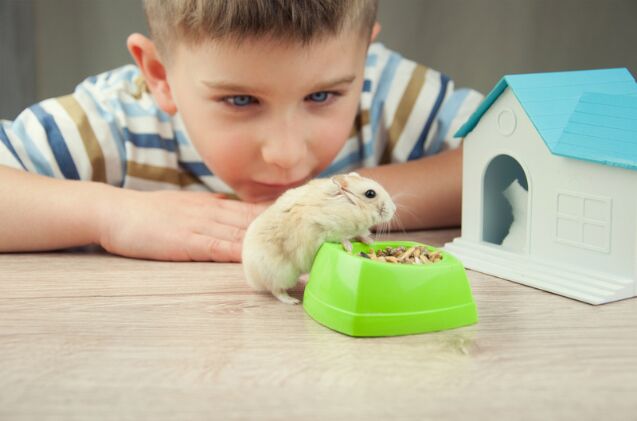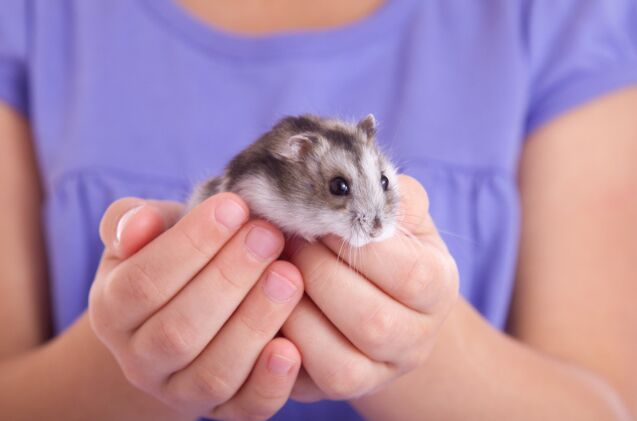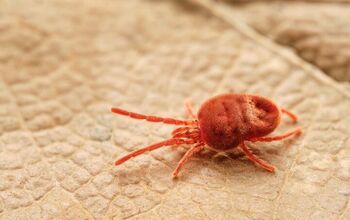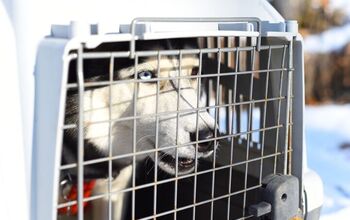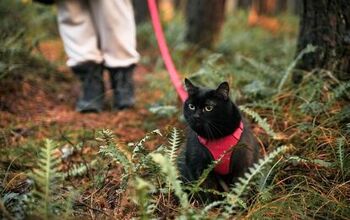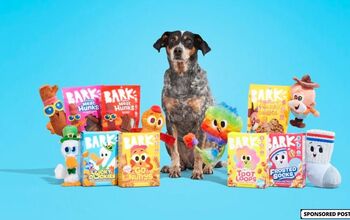Are Hamsters Good Pets for Kids?

Choosing the best pet for your family can be challenging, especially when children are involved. You must consider not only your lifestyle and the space available in your home but also how to create a safe environment for both your child(ren) and the newest furry family member.
In this article, we talk about the essential things to consider before buying a hamster for your child, including their usual temperament, health, and care information. We’ll help you decide if these small, furry companions are the right addition for your family. Plus, we’ll look at a few other options you may want to consider.
First Thing’s First, Is Your Child Ready for a Pet?
Before bringing any pet home, every parent should ask themselves whether this is the best time to take on this responsibility. Is your child ready for a pet? Are YOU ready for a pet? After all, a pet is a commitment!
If your child is younger, they may still require a lot of your time and attention. Is it realistic to take on more at this time, or would it be better to wait until your child is older and more independent? If they are older and you consider a pet an opportunity to teach responsibility, are you prepared to take on all the work yourself? There is always the chance that your child will be uninterested or won’t follow through on your new pet’s care.
Some other important questions to ask yourself include:
- Are there any allergy sufferers (or potential allergy sufferers) in the house?
- Is your choice old enough to learn to respect a pet, or will they be too rough?
- Are you financially prepared to take on a pet’s needs?
- Does your home allow space to separate your child and the pet, if necessary?
- Is your home environment safe and comfortable for a pet, or is it too hectic?
Remember, when bringing a pet into the family, you want to ensure that it is in the best interests of both the humans in the family and the pet in question. If you are at all hesitant about whether you can provide that pet with a happy, healthy, thriving life at this time, it may be best to wait. This doesn’t mean you can never have a pet; you just recognize this isn’t the right time.
Is a Hamster a Good First Pet?
Due to their small size, hamsters are often assumed to be a great introduction to pet ownership. However, don’t let their size fool you. Being small in stature doesn’t mean that a pet is low maintenance or the right fit for your lifestyle. In fact, I would argue that there is no ‘one-size-fits-all’ answer to whether a hamster will be a good first pet in your home because every home is different.
Many of the cages currently sold at pet stores for hamsters don’t provide the space they actually need. This can lead to stress, anxiety, illness, and behavioral problems. The recommended cage size will depend on the size of your hamster, but most experts recommend at least 600 square inches of floor space for a dwarf hamster and 800 square inches for a larger hamster. The ideal hamster enclosure will also be deep enough to allow your hamster to burrow.
These adorable little pets are highly independent, meaning they aren’t as interested in being held as many other pets. This can be a positive for some people, but not for those looking for a pet that is more interested in cuddles and attention.
Finally, consider your pet’s veterinary needs. Many new hamster parents don’t realize until they are in an emergency that a hamster needs to see a veterinarian that accepts “exotic animals,” which isn’t always easy to find! Researching this in advance can save you a lot of stress.
Are Hamsters Good Pets for Children?
Returning to the original question, are hamsters a good choice for a child’s pet? They can be in some homes. This will depend on your family, your child specifically, your lifestyle, and what you want in a pet. Here are a few factors to consider:
Do Hamsters Like to Be Held?
As previously mentioned, hamsters are incredibly independent. This doesn’t mean that your hamster will never want to be touched or held, but they generally aren’t the cuddly, loving pets that people come to expect from puppies and other more social animals.
It also doesn’t mean that there aren’t exceptions to the rule. My sister had a hamster who loved being held and petted by her, running to the door of her cage anytime she heard my sister’s voice. But most hamsters aren’t interested in that level of human interaction.
If you are looking for a pet that your child can hold and snuggle, you may want to consider another option.
Do Hamster Bites Hurt?
Another important consideration with children is your new hamster's risk of biting. If they are being handled roughly or held when they don’t want to be, there is a good chance this could happen. It’s not that they are aggressive, but they will protect themselves if they feel that they must.
Unlike larger animals, a hamster bite isn’t going to do significant damage. But they can still hurt! Especially for a young child whose pain tolerance may not be as high.
Are Male or Female Hamsters Better for Kids?
People often discuss the difference in temperament and personality between male and female dogs and cats. So, it is not surprising that gender can also influence how your hamster will act. Male hamsters are generally calmer, easy-going, and more affectionate. This can make it easier to train them to be held without biting or becoming agitated. For this reason, many experts will recommend male hamsters for children or first-time hamster parents.
Female hamsters, on the other hand, are often more energetic and boisterous. A female may be the better choice for those who prefer a spunky pet with a strong personality.
Of course, as with any other generalization, there are always exceptions to consider. You may find an extremely laid-back and affectionate female hamster or a male hamster that is super independent and always on the go. Like humans, they each have their unique personalities.
Do Hamsters Get Sick Easily?
The good news is that hamsters are generally healthy pets. But that doesn’t mean that they can’t fall ill! There are many potential health problems that we need to be familiar with. More importantly, like any pet, elements of your hamster’s care could keep them healthy or make them sick.
Here are a few of the more common ailments you may face:
- Dental Problems: Unlike us, a hamster’s teeth continue to grow throughout their lives. To prevent them from becoming overgrown and causing dental problems, they must be given access to appropriate chewing materials or have their teeth regularly trimmed by a qualified veterinarian.
- Skin Conditions: From allergy-related skin irritation to mites and ringworm, your hamster may suffer from dry, irritated, or infected skin. These conditions are often caused by or further aggravated by their environment, such as the choice of bedding or the cleanliness of their habitat.
- Digestive Problems: Diarrhea, also referred to as “Wet Tail,” is a common ailment in hamsters. This could result from stress, a bacterial infection, or their diet.
- Respiratory Infections: You may be surprised to learn that hamsters can contract pneumonia from their human family members! This is often characterized by sneezing, changes in breathing (like wheezing or attempting to catch their breath), or discharge from their nose or eyes.
- Diabetes: Hamsters have a high rate of diabetes. The best way to prevent this is by feeding a high-quality diet, avoiding high-fat foods, and ensuring your hamster maintains a healthy weight.
If you suspect your hamster is ill, you will need to be in contact with a veterinarian that accepts exotic animals. For those who live a significant distance from the nearest possible vet, I recommend a conversation with them about how to best contact them (or another resource) to determine if the trip is warranted in a potential non-emergency situation.
What is the Best Small Pet to Get a Child?
After reading this information, are you concerned that a hamster may not be the right choice for your family? Here are a few other awesome pets that may be a better fit:
Guinea Pigs
When I asked my veterinarian for a recommendation for this article, she immediately suggested that parents consider a Guinea Pig. Why? These cute little guys are super friendly and social, meaning they will enjoy building a relationship with your child. They are also very gentle, reducing the risk of your child being bit while simply trying to spend time with their new pet (assuming they are taught how to handle a guinea pig properly). With a growing number of guinea pigs being surrendered to shelters and animal rescue organizations, finding your new family member shouldn’t be difficult.
Birds
When considering the best pet for children, birds often don’t come to mind. But don’t count them out if your child loves these beautiful, feathered pets. While some species of bird may not be a good fit for children, especially young children, you may wish to consider:
- Budgies
- Finches
- Lovebirds
- Cockatiels
- Doves
To select the best bird for your child, consider the care they will require, your available space (some larger birds need A LOT of room for their habitat), and the potential noise level. Some birds can be very loud and talkative pets!
Cats
Our feline companions are often stereotyped as aloof, independent, and uninterested in connecting with their owners – but they can make very affectionate and loving pets. One important consideration is how your child will interact with the new kitty. Will they try to carry them around roughly? Will they attempt to pick up your cat each time they see them? Creating boundaries and always supervising their interactions will be important when your child is young.
Dogs
Of course, “Man’s Best Friend” is usually the first that comes to mind when discussing affectionate and loving pets. Some dog breeds are well-known for their gentle, caring, and family-oriented personalities, such as:
- Labrador Retriever
- Golden Retriever
- Boxer
- Poodle
- Newfoundland
- Cavalier King Charles Spaniel
- And many more!
Like with cats, you must supervise young children to ensure that they treat their new furry family member with respect. Familiarize yourself with dog body language cues to help you identify if there is ever a situation where you need to intervene to prevent trouble.
Final Thoughts: Hamsters and Children
Are hamsters good pets for kids? The short answer is, “maybe.” There are several key factors to consider when deciding if a hamster will be an excellent addition to your family, including the space needed for their habitat, their independent personalities, your child’s interest in a bet, the work (and finances) required to care for your new hamster, and the availability of a veterinarian that will accept small animals.
If your child is ready for a pet, but a hamster doesn’t quite check all the boxes on your new pet wishlist, there are many other options, including guinea pigs, cats, dogs, and some species of birds. Don’t rush this decision. Take time to research and find the best fit for your family before committing to your future furry (or feathered) family member.
Join the PetGuide community. Get the latest pet news and product recommendations by subscribing to our newsletter here.

Britt Kascjak is a proud pet mom, sharing her heart (and her home) with her “pack” which includes her husband John, their 2 dogs – Lucifer and Willow – and their 2 cats – Pippen and Jinx. She has been active in the animal rescue community for over 15 years, volunteering, fostering and advocating for organizations across Canada and the US. In her free time, she enjoys traveling around the country camping, hiking, and canoeing with her pets.
More by Britt



